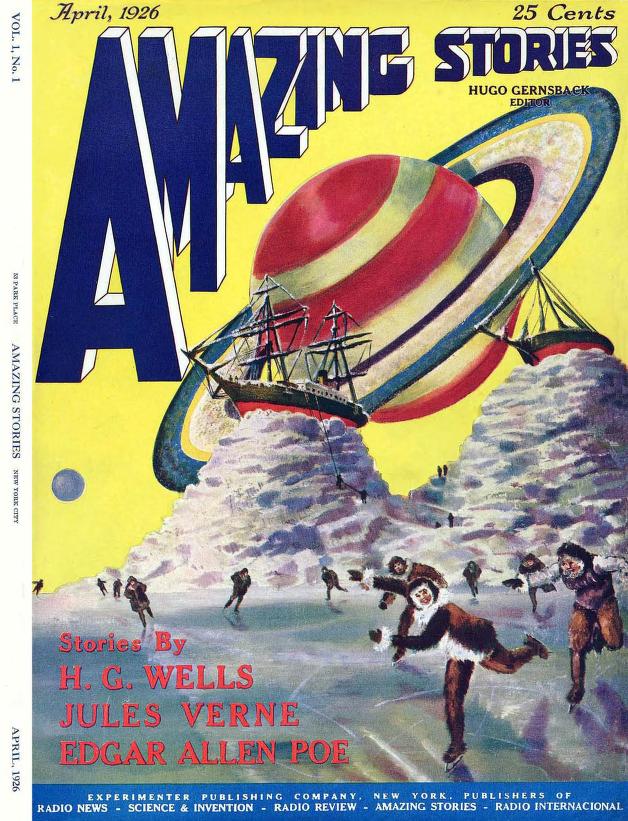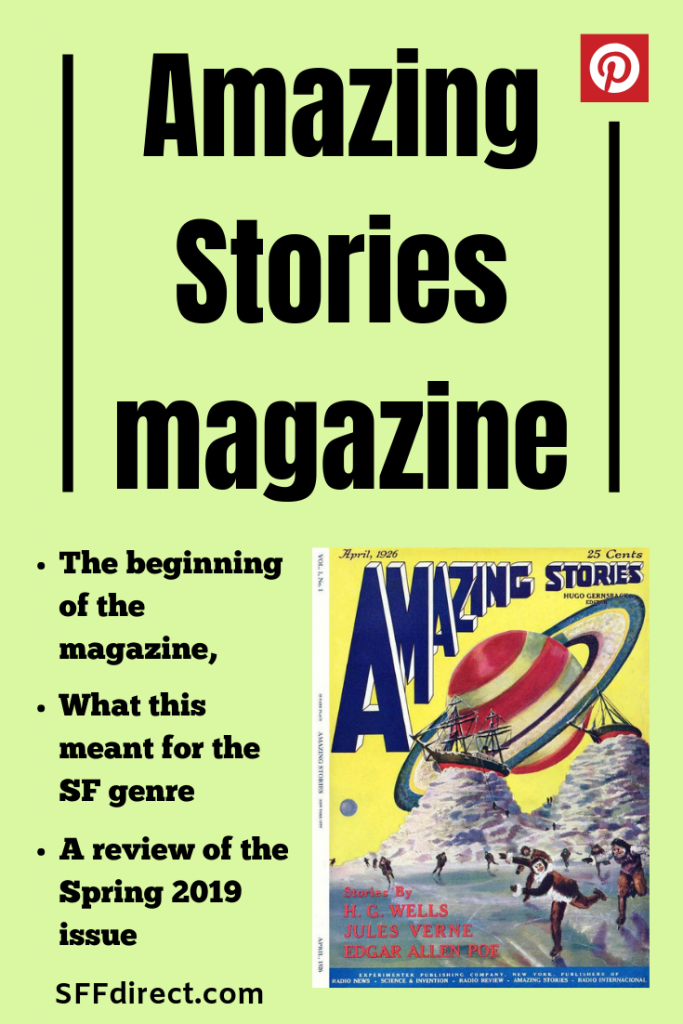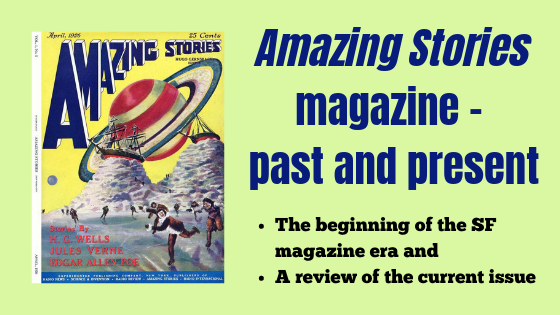There is considerable debate as to the origin of science fiction and the first written SF text. However, there can be no debate as to the first science fiction magazine. This article will describe the birth of that magazine and its status in the present day. It also contains a review of the Spring 2019 issue.
Something new
In 1926 a man called Hugo Gernsback launched a new magazine. He called it Amazing Stories. In the editorial he proclaimed that this was not yet ‘another fiction magazine’ but something ‘entirely new’. Read the first issue of Amazing Stories here.

He called it a magazine of ‘scientifiction’ and went on to say ‘By scientifiction I mean the Jules Verne, H G Wells, and Edgar Allen Poe type of story – a charming romance intermingled with scientific fact and prophetic vision’. (Back then the term romance was used to mean a story.) He said that with the increasing demand for such stories there was only one thing to do, which was to create a magazine for them.
As well as believing in the prophetic power of these stories, Gernsback also believed in their didactic power, saying that ‘the best of these modern writers of scientifiction have the knack of imparting knowledge, even inspiration, without once making us aware that we are being taught’.
As we know, the term ‘scientifiction’ didn’t catch on, and by 1929 the term ‘science fiction’ was firmly established. In those early days there was an emphasis on teaching and stories often contained infodumps of characters explaining to each other. The early SF magazines were called pulp magazines because they were made from wood pulp.
The flip side
While we have Gernsback to thank for kicking off the SF magazine era (and for inspiring the Hugo Awards), some people believe he caused more harm than good. It is because of him that SF became to be seen as distinct from mainstream literature, the province of ‘fans’. SF was seen as not serious, and things such as good characterisation, sense of place, imagery and innovation in form, style and language weren’t valued. It has taken until the present day for science fiction to be held up alongside mainstream works of literature.
Present day
So where is Amazing Stories now? The magazine has managed to survive into the present day. Since 1995, publications have been sporadic but it has held on. Following a successful Kickstarter campaign, the magazine relaunched last year and is open to submissions. They say they prefer optimistic stories but above all they want innovation. On the Amazing Stories website they say:
Science fiction readers are more sophisticated than they were an almost century ago; they’ve been there and done that with the formulae of the genre, and they’re looking for what’s next.
Amazing Stories hopes to be what’s next.
To see if they’re delivering on this I read the current issue (Spring 2019, Volume 76, Issue 3).
Current issue review – Spring 2019
The Editorial was interesting because it begins ‘Let’s talk about the predictive capacity of science fiction. It has none’. Things seem to have come full circle in that it completely contradicts Gernsback’s declaration that science fiction is extremely prophetic. Indeed, nowadays the genre tends to be more cautious about its predictive power.
The Editorial goes on to discuss Gernsback and how he printed readers’ letters, and asks whether the current magazine should publish readers letters. An interesting question in the days of social media and email, but a valid one.
Fiction
On to the rest of the issue. First of all, I’d like to say I thoroughly enjoyed it, both the fiction and the non-fiction. However, I’m struggling to see anything truly innovative. The first story, ‘Red Shift’ reminded me of a Star Trek Enterprise episode where a family had lost a man when testing the first transporter and they were trying to get him back, deceiving the Enterprise crew that they were doing different research. You would expect the first story to be one of the best, if not the best, of the magazine so this was disappointing. It wasn’t very optimistic either.
My favourite was ‘Cricket Songs’. This is about a girl who finds an alien visitor; he’s small enough to live in her doll’s house. I won’t give any spoilers but it was a lovely story.
I also liked ‘Out-of-Most-Worlds Planet Cessation Extravaganza’ – I found it humorous and interesting – and ‘The Whether App’. This is a tale where an app that changes the weather goes wrong.
‘God Bless the Freaks’ surprised me because in my opinion it was fantasy rather than science fiction. I enjoyed it, even if it was quite bleak. The Editorial acknowledges the bleakness of this story though, and justifies its inclusion in the magazine.
A story I didn’t like was ‘T-Minus’; I just found it irritating and boring.
Poetry
I enjoyed the poetry very much and would have been happy to read more of it. I know it’s a difficult balance for editors because in general readers prefer more fiction and less poetry.
Summary
To summarise the style of the magazine I would say that the fiction style is mainstream, which is absolutely fine with me. I like stories told in a traditional way and I tend to shy away from the more experimental styles unless they’re done really well. I also don’t really enjoy anything too weird or strange, and Amazing Stories doesn’t contain anything in either category, which is fine. And I guess the tone was generally light-hearted, which is consistent with their claim of being ‘optimistic’.
In short, I’m glad I subscribed and I’m looking forward to future issues.



Thanks for the review/commentary and glad you liked the issue.
We’re a bit schizophrenic here; Ira, as editor, is free to express his feelings, and he is correct in assessing the current take on SF’s predictive qualities as being “none”, while I, as publisher, continue to support the idea that “extrapolation” is one of the fundamental pillars of the genre – a position that I fairly regularly address on the website blog.
Hi Steve, Thank you for your comment. Great to hear from you, and yes I love the magazine! 🙂